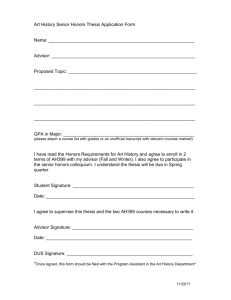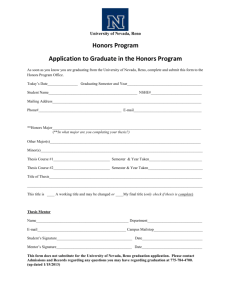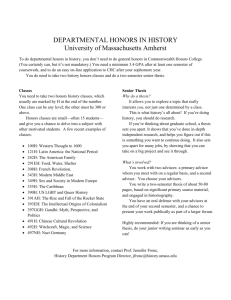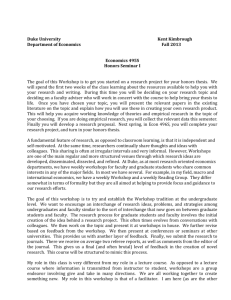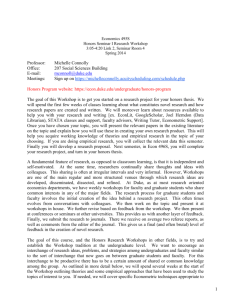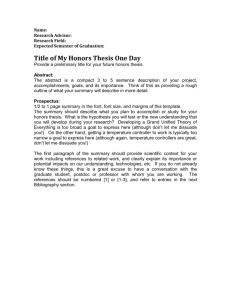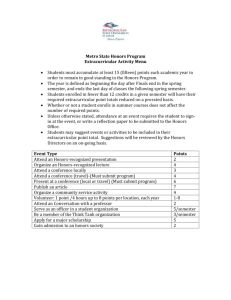ECON 496S. Honors Semiar II, Kent Kimbrough
advertisement
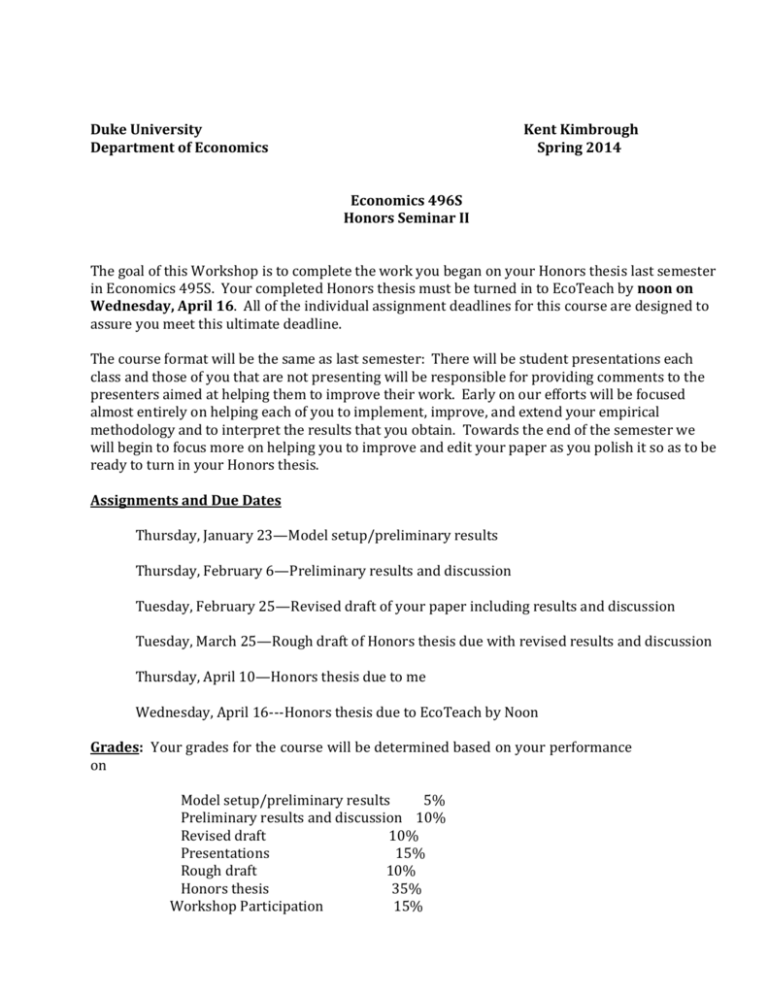
Duke University Department of Economics Kent Kimbrough Spring 2014 Economics 496S Honors Seminar II The goal of this Workshop is to complete the work you began on your Honors thesis last semester in Economics 495S. Your completed Honors thesis must be turned in to EcoTeach by noon on Wednesday, April 16. All of the individual assignment deadlines for this course are designed to assure you meet this ultimate deadline. The course format will be the same as last semester: There will be student presentations each class and those of you that are not presenting will be responsible for providing comments to the presenters aimed at helping them to improve their work. Early on our efforts will be focused almost entirely on helping each of you to implement, improve, and extend your empirical methodology and to interpret the results that you obtain. Towards the end of the semester we will begin to focus more on helping you to improve and edit your paper as you polish it so as to be ready to turn in your Honors thesis. Assignments and Due Dates Thursday, January 23—Model setup/preliminary results Thursday, February 6—Preliminary results and discussion Tuesday, February 25—Revised draft of your paper including results and discussion Tuesday, March 25—Rough draft of Honors thesis due with revised results and discussion Thursday, April 10—Honors thesis due to me Wednesday, April 16---Honors thesis due to EcoTeach by Noon Grades: Your grades for the course will be determined based on your performance on Model setup/preliminary results 5% Preliminary results and discussion 10% Revised draft 10% Presentations 15% Rough draft 10% Honors thesis 35% Workshop Participation 15% 2 Model setup/preliminary results: Your baseline empirical methodology needs to be outlined and preliminary results presented. Tables of results must be included in Journal of Political Economy form. You should discuss your results and focus on problems and other empirical specifications you are considering to deal with these problems, to extend your results, and to test for robustness. Preliminary results and discussion: A continuation of the previous assignment with more emphasis on your results and your discussion of them. Additional tables should be included. Revised draft: A revised draft of your complete paper including your findings and a discussion of them as they currently stand. Rough draft: A rough draft of your Honors thesis. You may still be working on your results but, hopefully, by this time it will be dotting the i’s and crossing the t’s rather than anything major. I will have your papers back to you by Thursday, March 27 giving you two weeks to clean up everything for the final draft of your Honors thesis. Honors thesis: This is what all the blood, sweat, and tears have been for! Workshop Participation: On days you are not presenting you are expected to come to class having read the material posted for that day. You will be expected to provide thoughtful, constructive comments to presenters as to how they might improve their paper, additional data sources or literature they might explore, etc. In addition, you will be expected to provide one to two written suggestions that each presenter can consider for incorporation into the next draft of their proposal. At the start of each class you need to provide one copy of your comments to each presenter and one to me. You are not required to present written comments on the days you are presenting. The written comments will begin with the start of the “Initial Research Presentations.” Procedures for Written Assignments: All written assignments are due by the start of class on the assigned day. By that time you are to provide me with a pdf file of your paper with the filename in the format Lastname mm-dd.pdf. Papers are to be double-spaced and you should follow the format for numbering equations, presenting tables and figures, and listing references found in the Journal of Political Economy. Late papers will be penalized one full letter grade immediately and then two plus-minuses for each additional day they are late. (So for example, an “A” paper due at 10:05am on a Tuesday and handed in at noon on Wednesday would receive a grade of “C+” with the penalty.) Contact Information: Office: Office hours: Telephone: E-mail: 227 Social Sciences Building Wednesdays 10:30-11:30 by appointment 660-1811 kent@econ.duke.edu Note: The subject line of all e-mails should start with ECON 496S 3 Research Paper Guidelines Your assignment this semester is to complete the work on your Honors thesis that you began last semester. Your completed thesis should contain the following sections: I. Introduction - The introduction should motivate your topic. That is, why is it interesting and relevant today? You may also provide necessary background institutional detail. Then, you should briefly place your work in the context of what has already been done, with the goal of identifying the gap in the literature you intend to fill. Next, you should clearly state your thesis – the single main argument of your paper. Finally, you should include a road map outlining the structure of your proposal. II. Literature Review – Here you should more fully discuss the work that has already been done on your subject. Focus on the research that is most closely related to your own work. The goal of this section is to place your work into the context of what has already been done. It should be clear by the end of this section what your original contribution to the literature will be. III. Theoretical Framework - Describe the relevant economic theory. This is, most likely, not where you will make an original contribution. Perhaps you will be testing a particular theory. You should lay that theory out here (using graphs and equations as appropriate). What does the theory suggest ought to be true empirically? Perhaps the theory is not decisive. What remains is an empirical question you intend to answer. Outline the theory here and demonstrate how it does or does not offer a clear prediction. Leave the reader with an understanding of how the theory informs your work. Perhaps it offers a clear testable prediction. Perhaps it will only inform your empirical specification (e.g. what are likely and appropriate explanatory variables?) IV. Data (For Empirical Papers) - What data will you use in your work? Describe the data. What is its source? Why are these the appropriate or best data for your project? Acknowledge any weaknesses. By the end of the semester you will want to have your data in hand and know that it is operational. The best way to know this is to have run some basic descriptive statistics (e.g. means and standard deviations). These should be included in this section along with a discussion of these statistics. Later on this section might include more detail on how you may have created particular variables for your own use in your particular project. (Extensive detail along these lines might be left for a data appendix.) V. Empirical Specification (for Empirical Papers) - This section should describe how you plan to empirically estimate your model. What are the dependent variables? What are the independent variables? Do you have expectations about the signs and/or the magnitudes of the coefficients you plan to estimate? Ultimately, this section will also include your findings from your study and may also include a comparison of your results to what others have already found. 4 VI. Conclusion - This will obviously be largely left until your study is complete as you will want to summarize your findings in this section. You may also want to discuss any policy implications of your study as well as leave the reader with a sense of the questions that remain unanswered.
